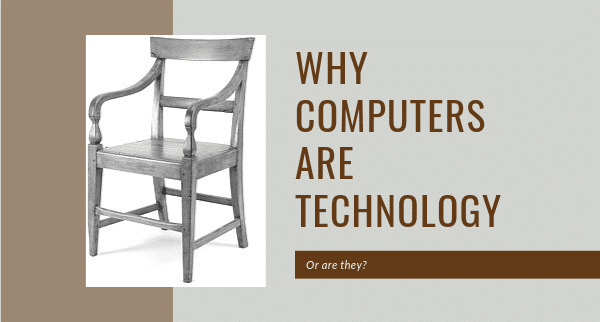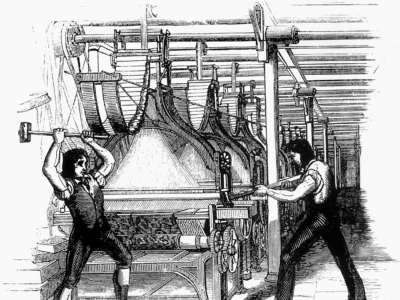This first appeared on LinkedIn.

A chair is not technology.
“…problem with the net is that it’s still ‘technology’, and ‘technology’, as the computer scientist Bran Ferren memorably defined it, is ‘stuff that doesn’t work yet.’ We no longer think of chairs as technology, we just think of them as chairs. But there was a time when we hadn’t worked out how many legs chairs should have, how tall they should be, and they would often ‘crash’ when we tried to use them. Before long, computers will be as trivial and plentiful as chairs (and a couple of decades or so after that, as sheets of paper or grains of sand) and we will cease to be aware of things. In fact, I’m sure we will look back on this last decade and wonder how we could ever have mistaken what we were doing with them for ‘productivity.’”
~ Douglas Noel Adams (DNA), 29 August 1999.
These are powerful words from a very articulate man (one of my favourite authors) who gave a lot of thought to what he said and wrote. But the interesting fact (apart from the content) is the time at which he said this. Look at the date, for example. This was written 20 years ago! Computers were “plentiful chairs” within 10 years from then, and if you were to consider his “prediction” of them becoming invisible in a “couple of decades or so after that”, you will see he grossly overestimated the amount of time it would take for them to become ubiquitous. They have been ubiquitous for so long already in 2019 that there is a large section of the world (with a median age of around 27, which means on an average human in today’s world was born around 1990 and became a teenager well into the 21st century) today that does not remember a time before computers and cannot fathom how we ever managed to live normal lives without them!
On a side note, we should not be surprised if people who have never seen a rotary phone wonder why the icon for “Phone” is what it is, or people who have never seen or used a floppy disk wonder why the icon for “Save” is the little notched square, or the icon for “Mail” is an envelope. Soon, we’ll have people who’ll wonder why the icon for “Amazon Shopping” is a funny-looking cart (because they’d never have been to a superstore, or in fact, superstores themselves might have become extinct then), as also people who have never seen a physical camera wondering why the icon for “Camera” looks like that, or that for “Contacts” looks like a diary with tabs! Technology, it would seem, moves too fast for even technology to keep up.
That being said, we still look at computers as “technology”. Why haven’t they become trivial, as DNA predicted, and “not technology” yet?
Is it because we haven’t yet found the limits to what they can do. We know what a chair or a shirt, for example, can do. We have tried more or less all the unique combinations of making and using them, and while that still leaves a lot of scope for innovation in design, materials, manufacturing processes/techniques, and features that may be added/modified to the current designs, the truth is that it would be a rare chair or shirt that, regardless of its innovative design, if shown to us, we cannot figure out how to use instinctively and without confusion or requiring instruction.
Is it because of the broad-based definition we have created for them, which makes almost every machine we use a “computer” of some sort? For example, a car is as much a computer today as a desktop or a mobile, as is a wristwatch (do people still wear them?), as is a printer or a food processor or a TV or an elevator or automatic doors or electric kettles/toasters. In fact, even a simple light switch can be called a computer by our definition. It takes an input, and based on a logic that has been programmed into it (even if hard-wired), creates an output at the other end. So, is it because we have created too generic a definition for a computer that almost anything can be interpreted as one? Do we then need a new name for this to distinguish it from computers that are still “technology” and those that are not?
Or are there other reasons? What do you think?
















